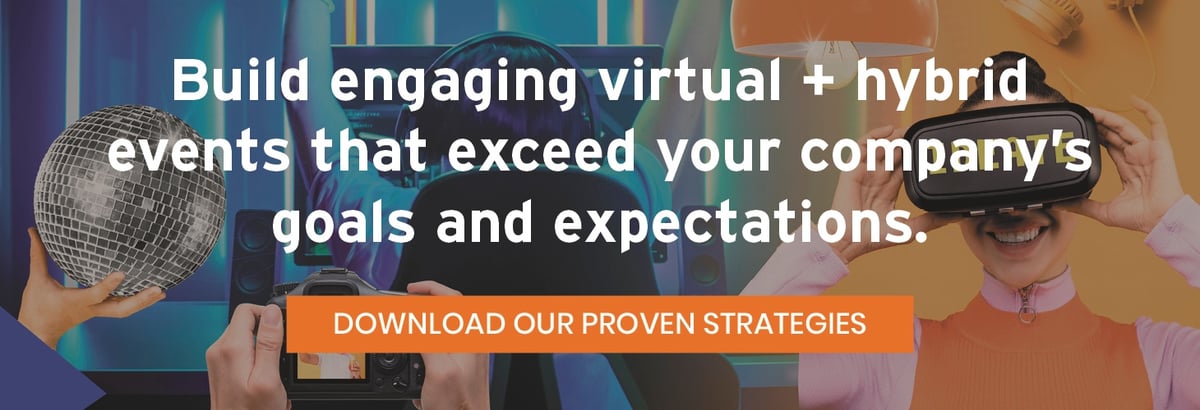Tackling the Top 5 Misconceptions About Virtual Events

As virtual events continue to be a part of audience engagement and event programming strategies in 2021, there are still a lot of things people don’t understand about the online environment.
Companies that hold these misconceptions are being left behind during COVID-19, while smarter brands are taking full advantage of this time to build stronger connections with their audiences. Breaking through these common myths and misconceptions starts with understanding your goals and your customers’ goals first, then building a strategy to successfully produce a virtual event.
With the pivot to the virtual event space happening so suddenly and the trends evolving so rapidly, alongside so many options to choose from and a saturation of information to sift through online, it can be difficult to identify the things that actually contribute to your success. Here are some of the top misconceptions about virtual events and the real “do’s and don’ts” for developing an engaging and meaningful virtual experience:
Misconception #1: Virtual events require completely different skills and a brand new toolkit.
On the contrary, many companies that are switching over from in-person events to virtual events have the toolkit to make it happen without having to reinvent the wheel. Think of a virtual event as a “new venue” in an unfamiliar location. You can still provide the same dynamic message in an engaging way, just in a new space.
Transitioning to virtual events opens up a lot of new opportunities. It allows you to connect with your audience on a much larger and broader scale. It also provides flexibility that in-person events cannot. Making the switch to virtual events requires you to focus on your key messaging, content, and making those two harmonize to resonate with your audience. If your team is dedicated and passionate about the brand and message you’re providing, you’ll be able to give attendees a meaningful virtual experience that truly builds connection and creates impact through their screens without having to reinvent anything.
Misconception #2: User needs have changed.
Your target audience’s needs, at their core, are still about engagement. What has changed is the way you engage them. Effective engagement is still possible through a virtual platform, and in fact, virtual opens up a whole new world of possibilities. For example, check out a few of these events that successfully involved virtual audiences while projecting a strong and relevant message:
- Athletic inclusion: Helping people safely connect with each other on teams and still compete in an athletic competition, this is a virtual team run that ran coast to coast.
- Pop-Up Magazine: Taking a live magazine created for a stage and reimagining it for the screen, the virtual version of this performance gathered a global audience for their portrayal of multimedia stories.
- Fargo Pie: Celebrating the fourth season of the iconic Fargo TV show by sending out “pie kits” containing real pie slices, recipes, and inspiration from chefs.
Many companies have been wary about investing in virtual events because this new medium felt only relevant for certain events and forms of engagement. But due to the pandemic, we’ve been forced to use the virtual space to look for new and exciting ways to get audiences what they need and sharing our messages and brand story at the same time. The result? Higher attendance figures than ever.
People are attending virtual events because they are at home looking to connect, and virtual events are easier, more accessible, and more affordable for attendees than traveling. Ultimately the needs are the same, but the way you meet those needs has changed.
Misconception #3: We can DIY this ourselves.
Trying to orchestrate a huge event and owning every element from audience outreach to messaging development, content creation, and speaker management, on top of dealing with stakeholders, budget, and all of the vendors — impossible. Especially if this is your first virtual experience.
At the same time, the knowledge of your audience and brand that you bring to your events is invaluable. You know things about your audience and what they want that an outside agency can’t provide. This is the best investment of your time: ensuring the event brings value to them in order to maximize impact and engagement with your event.
If you put all of your effort into organizing and producing the event, you won’t be able to give enough attention to the important parts where your expertise will really make a difference.
Partnering with a passionate external team of solution-finders that are invested in your brand and message will bring your vision to life in ways you did not know were possible. What’s more, a good team will help activate your knowledge of your audience and brand to create an experience that brings your best ideas to life. Having a team of virtual event experts will offer the support you need to execute it effectively, letting you focus on what you do best.
Misconception #4: Virtual events should be less of an investment than in-person events.
Events are meant to immerse attendees in your brand’s story and allow them to feel enriched and engaged by what you have to offer. Whether that’s an immersive makeup event with a grab bag at the end of the experience, or celebrating advances in medicine by increasing awareness through interactive experiences, or a virtual event where 1300+ employees rallied together around the company's goals and programming energized, inspired, and motivated attendees to tackle 2021!
If you haven't done virtual before, it is best to work with someone who has. Even more than in-person events, which heavily rely on attendees interacting with each other, you have to program every second of their time with you (content AND the attendee journey). Unlike in-person events, you can't just throw a speaker on the stage and let them do their thing. You need to be sure the speaker is engaging for the virtual audience or they will just tune out. Bringing on external support that is experienced in the exploration and development of virtual experiences can make or break creating a successful event.
Misconception #5: Virtual events are faster to produce and need much less management.
While virtual events do not require the same type of resources, travel plans, and costs as in-person events, they still take substantial effort and planning. If you are pivoting a traditional in-person event to virtual, rebuilding your event for the screen takes a lot of time: from developing the new concept, pre-recording and editing content, to completing all programming 4 weeks in advance to test and load it onto the platform. Just like anything, you get out what you put in.
Now in a space where every second of the event needs to be programmed, an expert team of event strategists can help you build your virtual event and tell your story in a clear and engaging way that connects with the audience and delivers a compelling virtual experience to attendees. Effective management is key to creating a successful event, no matter if it’s virtual or in-person.
By overcoming these misconceptions, you can break through the noise and create a virtual event that is dynamic, engaging, and immersive. You can go beyond the norm and explore new tactics that will push your brand forward and keep your audience connected and interested — maybe even adopt a new event concept that can be used in years to come.
Gathering the right tools for a successful virtual experience
What many companies don’t realize is that you already have the most important expertise to respond to the needs of your audience virtually. You just need the right partners who can take on the tech, storytelling, and engagement programming to bring your message to the virtual world.
Virtual events don’t have to be intimidating, they’re just misunderstood. Let us provide reassurance and give you the confidence to execute a virtual event. To learn more about virtual event planning, contact us at DPEM for a 30-minute exploratory call. Our team of experts and innovative event specialists will help you successfully focus your message, unique point of view, and audience knowledge to create an impactful virtual event.

